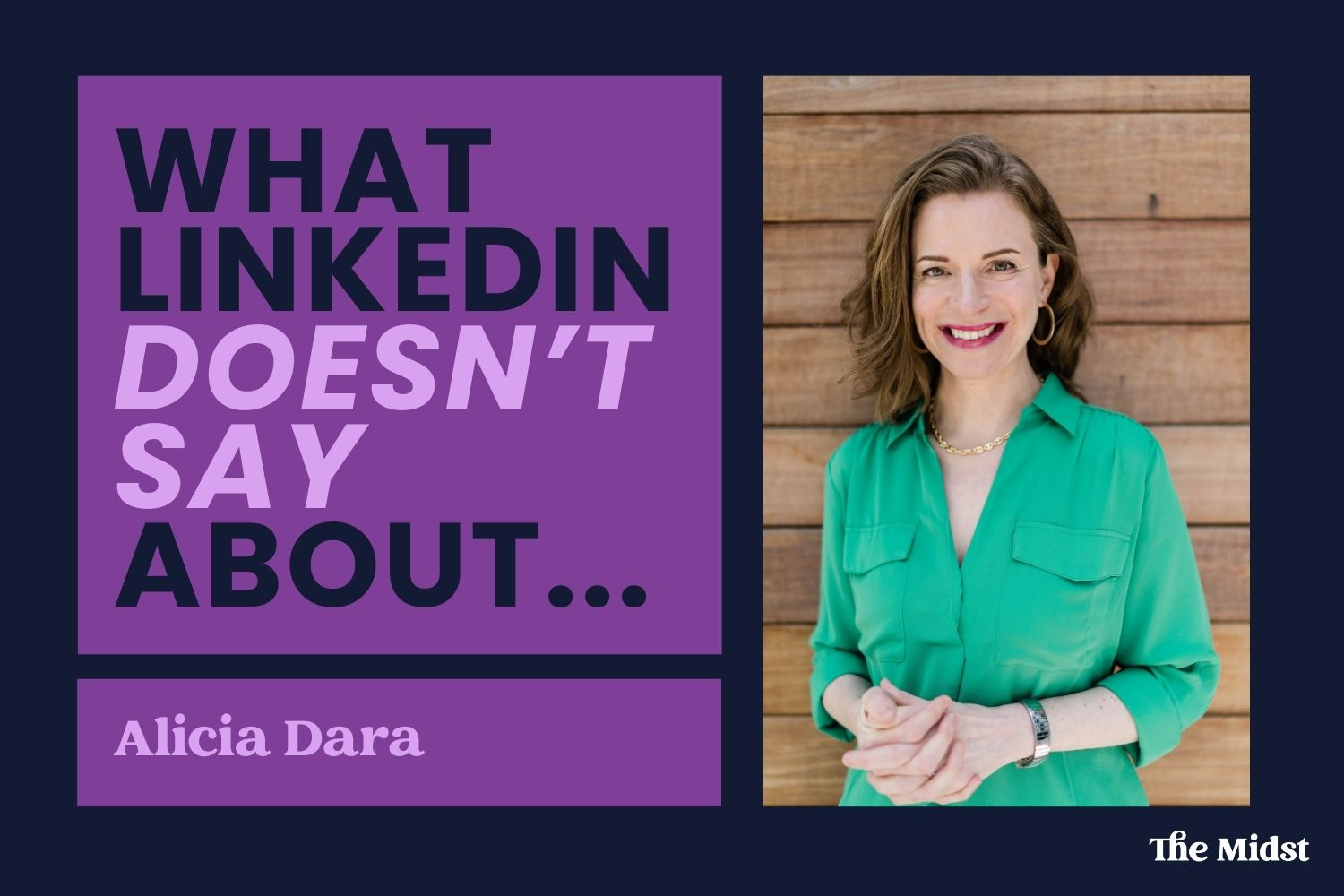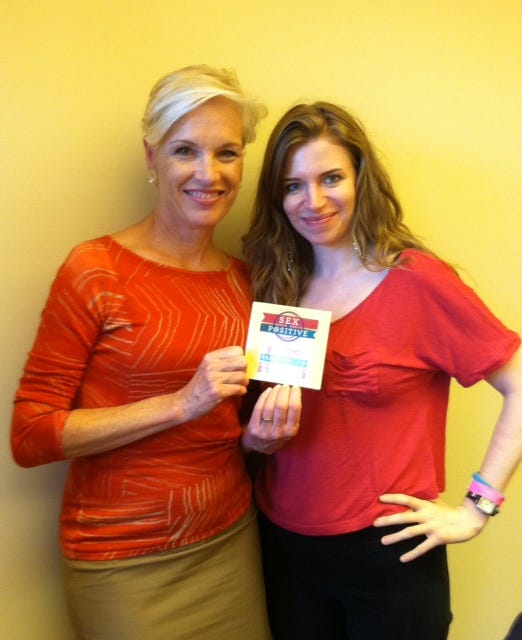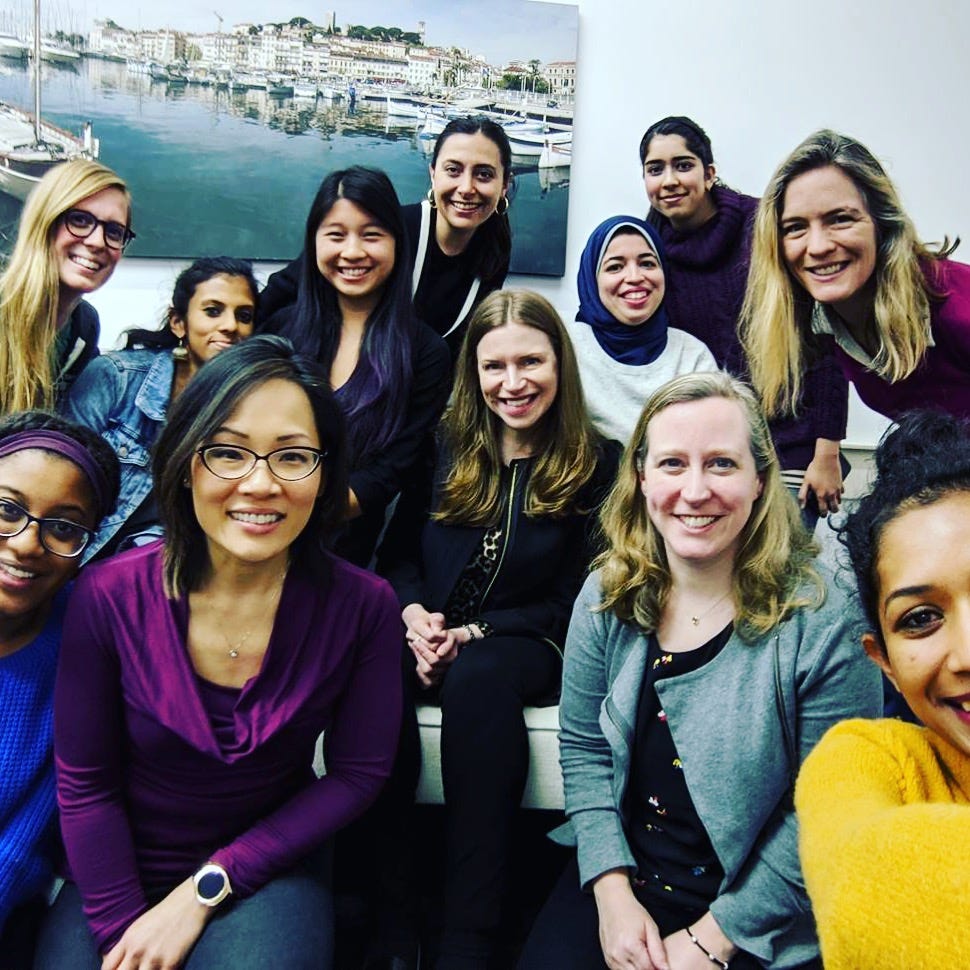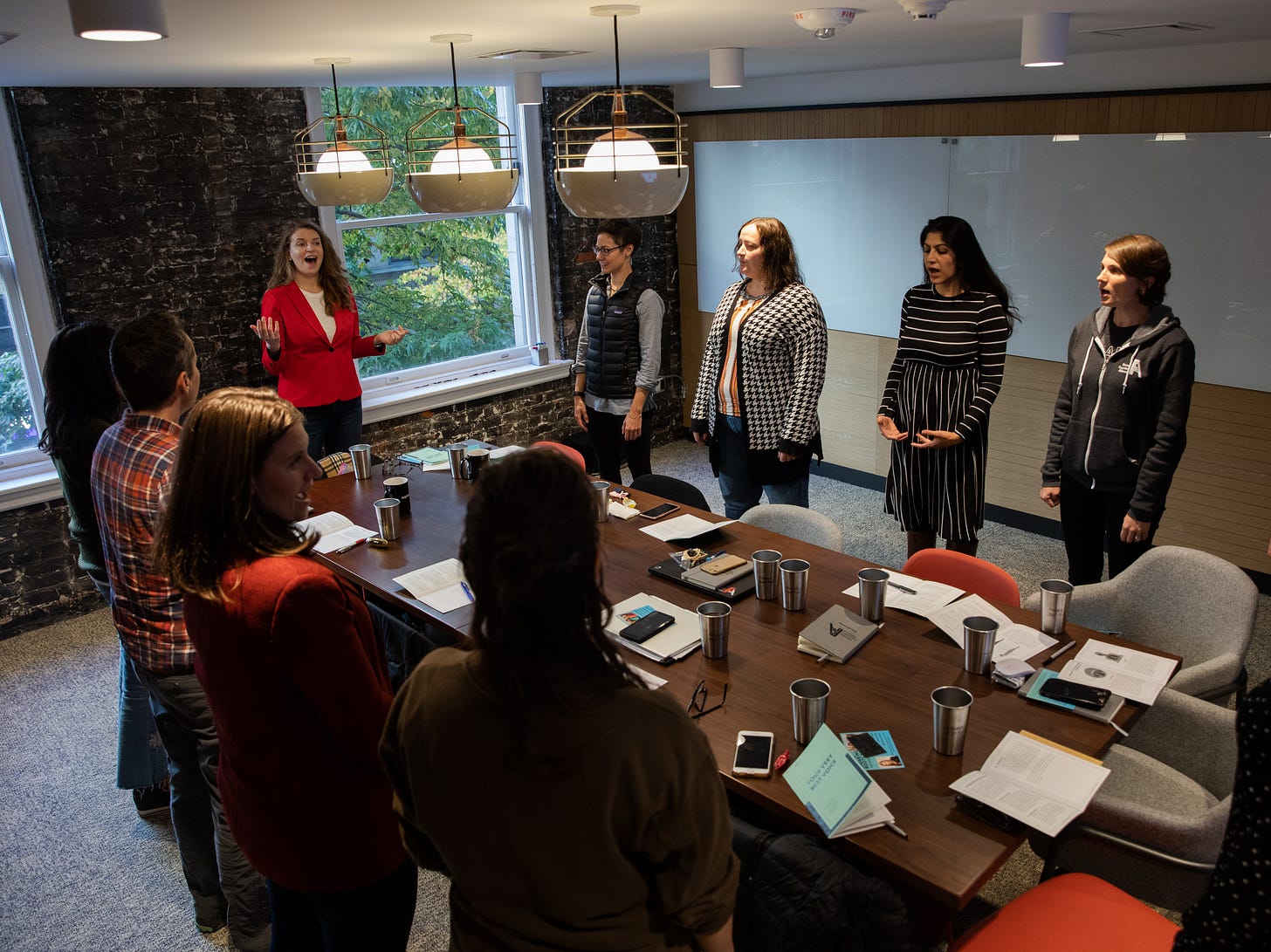What Linkedin doesn’t say about Alicia Dara, successful solopreneur, executive coach, and founder of Womancake Magazine
+ 4 tips to thrive as a freelancer or one-person show
This career-long solopreneur started as a musician and has built a career as a singing teacher, public speaking coach, and executive coach
Alicia Dara, 51
Seattle, Washington
Let’s connect: Linkedin • Instagram • Substack
File under: Executive coaching, professional development, women in leadership, C Suite women, coaching, women’s media
I’m in the midst of: Growing my executive coaching business, which takes me all over the U.S. to work with high-level individuals and corporate teams. I’m also growing the staff of Womancake Magazine, my platform for women over 40 that I started in 2022.
Beyond that, I’m working on expanding skills like cooking, working out, and investing. I was stuck in a scarcity mindset for a long time, and have only recently begun to break free. Gotta say, it’s pretty great!
Previous locations: Born and raised in Vancouver, B.C., educated in New York City.
Relationship status: Been with my Hubz for 12 happy years. We are childfree and very connected to our community.
Partner’s age and profession: 52, CTO
My income: I don't talk about my finances in public forums. But I do have financial and business tips for freelancers and solopreneurs:
1. Think big about your money, even during the leanest times
That means saving and investing tiny amounts now, so that you have good financial habits in place that you can scale as time goes on, and you generate more income. Don’t be afraid of investing! I waited too long on this; I should have jumped in much sooner. Before I worked with my financial planner, I used Ellevest for a few years, and it taught me a lot.
2. Stop messing around with social media and start investing in actual relationships
Your goal is to create a robust client pipeline that comes directly from past client referrals, and that will only happen if people know you, like you, and trust you to help them get where they want to go. You can work at a discounted rate in the beginning, just to build up your client list.
3. Don’t under-promise and over-deliver
This is a common mistake that many freelancers make at the beginning of their careers and stay stuck in for too long. Don’t do this!
Under-promising and over-delivering is the quickest way to burn out. Clients will treat you as if they own all of your time, and you’ll be running to catch up forever. Make the value of your work clear and price it accordingly, and deliver at that level. Your power comes from this simple balance. If clients want more of your time, charge them for it!
4. Create a Friday Power Hour
I learned this from my high-level clients. As you go through the week, whenever you come across an article, podcast, or other media that interests you and sparks your curiosity, put it in a dedicated folder. Look for articles about what’s happening in other sectors and industries: how are leaders solving problems, and what kinds of trend-spotting are they doing?
Once a week on Friday afternoons, listen to and read everything. Spending time in this mindset will break you out of your usual ways of thinking, and that can lead to much more effective solution-making in your own work.
Work remotely or onsite? Both. I work with private clients remotely from my home office in Seattle, and I also fly around the country working onsite with high-level individuals and corporate teams. I like this combination of flight and return; it makes each week feel new and fresh.
A typical weekday schedule in a nutshell: If I’m at home, I’ll work Monday–Friday from 8 am to 5 pm (with an occasional weekend travel day if that’s how my schedule works out).
If I'm traveling, then all bets are off, and I’m on a client’s schedule and timeline. Most clients will fly me in the night before I give a big training, so I have time to catch my breath and prepare. The next day I bring my carry-on to the venue and fly home right afterward. Sometimes I have to fly to another city for another client. My schedule is like a game of Tetris, with all these different bookings coming at me, and I just have to stay calm and arrange it all in a way that allows me to keep my sanity while working at my highest level.
Ideal schedule: Mostly I’m fine with my current schedule, although I’d love to be able to wrangle it so that I could do no more than two trips per quarter. Sometimes my travel is all crammed into a few months, and it’s a lot! Once I’ve worked with a big corporate client and they want to book me again, I will often ask if we can schedule the next training a few months in advance. That keeps things manageable.
How much my career is tied to my identity: 50%. I learned a long time ago not to over-identify with a career. People are a lot stronger if we stay fluid and flowing rather than stuck in a single groove.
My work also involves engaging multiple skill sets, and I try to keep adding to them as I go. For example, last year I learned a ton about neuroplasticity, so I can better help my clients employ a growth mindset to everything they do. This year I’m learning about systems theory, so I can better understand the way they see the world and their own high-level work.
“I learned a long time ago not to over-identify with a career. People are a lot stronger if we stay fluid and flowing rather than stuck in a single groove.”
— Alicia Dara
My happiness meter: On a daily basis? 8/10. It would be closer to 9.5/10 except for ongoing perimenopausal issues that make my physical pain threshold higher than it should be. Looking forward to crossing over to the other side of all that!
Career timeline in a condensed nutshell
1996: Started teaching singing lessons privately at arts organizations
Takeaway: People will always come back if you elevate their mood and expand their sense of possibility.
Why I left: I earned enough money to cover my bills but not much more than that.
2011: Started adding public speaking to my coaching business
Takeaway: I quickly realized I could make much more money, and I identified a key demographic that needed a ton of help: professional women. I started giving big and small group trainings that began to attract a ton of attention.
Why I left: I wasn’t feeling challenged by the kind of clients I was working with.
2021: I pivoted to executive coaching
Takeaway: Working with high-level, high-performing individuals and groups is constantly inspiring. I’ve gotten an education in all kinds of sectors, and I’ve been able to help tons of professional women from around the world find their Power Voice. They often keep in touch with me after we’ve worked together, and I love hearing about their ongoing accomplishments and success, it’s the best part of my job!
My career trajectory: “Lifetime” solopreneur
I’ve been largely self-employed my whole career, and I’m used to the slings and arrows that go with it. I was born to a family of professional musicians, and I trained as a singer from an early age. After high school I studied musical theater at a conservatory in New York City.
I was extremely shy socially, but I was told (in quintessential ’90s language) that my stage confidence was “fierce”. None of this made me love musical theater. I didn’t want to sing songs about being a woman that were largely written by men. In my last year of school, I started playing guitar and writing my own songs and immediately felt better.
I moved to Seattle in the mid-’90s and worked hard in the music scene (which I wrote about here). I had a boyfriend who was a guitar player in a band, but he also wanted to sing, so I gave him voice lessons. His voice got much better and many people noticed, and they asked me to teach them. That was the first phase of my career.
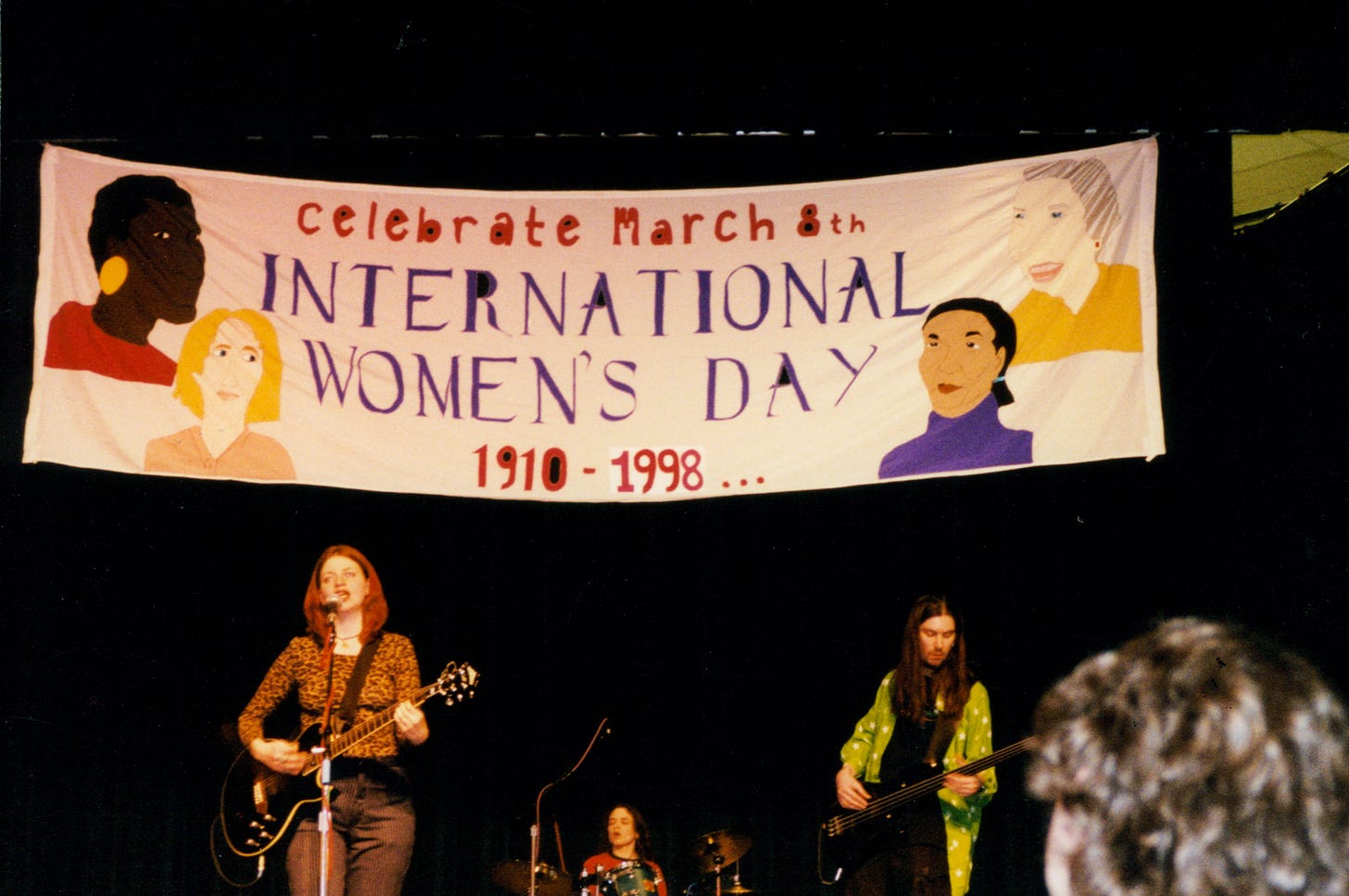
During that time I taught teenagers and adults, both privately and for various arts orgs. I worked with all kinds of local musicians including some rock stars and industry types. I also made a ton of records of my own music, and toured around the country whenever I could afford it. This was during the Lilith Fair era, when venues would pay good money for women to perform their original songs. I also played and sang back-up in other bands, and did some voice work in commercials and soundtracks. I eventually formed my band Diamondwolf, and we won some awards, which felt great.
About 15 years ago people started asking if I would coach their speeches for weddings, Bar Mitzvahs, and work presentations. I noticed that professional women often struggled with the confidence they needed to just be in the room, let alone speak up for their work. I created a training called “Public Speaking Bootcamp for Women” and taught it to groups in downtown Seattle. Word spread quickly and every training was full. I had no idea how much it was needed! I decided to get an actual coaching certification, which made me more attractive to corporate clients. One of my old friends from the Seattle music scene reached out to me from Microsoft, where she was employed, and asked me to give my bootcamp training to the women on her team.
“I noticed that professional women often struggled with the confidence they needed to just be in the room, let alone speak up for their work.”
— Alicia Dara
From there, my coaching career took off. I coached huge groups on the Microsoft campus, and private clients in my home office. This was also a time when I was volunteering for my local Planned Parenthood office almost weekly. I put together a CD compilation of local artists to benefit PP, and it was endorsed by Cecile Richards herself. Learning from the largely female staff at PP was an honor. It strengthened my belief in the power of compassionate, science-based public health policies that can uplift the health of entire populations, and it showed me the power of community support.
My reputation became better-known, and in 2016 I coached a prominent political candidate in their campaign office (in case you're wondering, that environment was almost exactly like the chaos you’ve seen on “VEEP”). This led to more high-level performance coaching for other public figures.
Keep reading with a 7-day free trial
Subscribe to The Midst to keep reading this post and get 7 days of free access to the full post archives.






